Vaccinating your dog is critical to keeping them healthy and safeguarding them against preventable diseases.
A clear dog vaccinations schedule can help you understand when and why certain vaccines are necessary for your dog’s wellbeing.
This blog will walk you through an ideal dog vaccinations schedule, explain the importance of adult dog vaccines, and answer key questions about dog vaccination to simplify and enhance your pet care routine.
Let’s begin by understanding dog vaccinations schedule what’s involved and how to keep your furry friend safe for life.
Table of Contents
- Why Vaccinations Are Crucial for Your Dog
- Puppy Vaccination Schedule
- Adult Dog Vaccines and Booster Shots
- What Dogs Need in a Core vs. Non-Core Vaccine Schedule
- FAQs About Dog Vaccinations
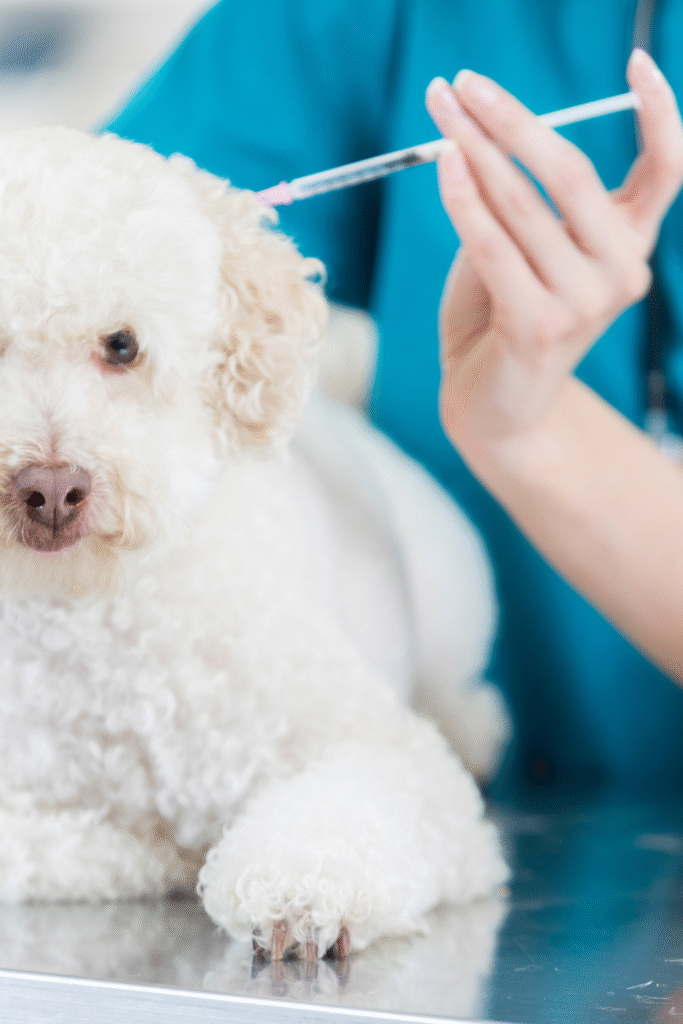
Understanding Dog Vaccinations
As a responsible pet owner, it’s important to stay up to date with your dog’s vaccination schedule.
Vaccines are vital for protecting your dog against infectious diseases that can be life-threatening.
They work by stimulating the immune system and building immunity against specific diseases.
What Are Dog Vaccines?
Dog vaccines are biological preparations designed to provide immunity against specific infectious diseases.
They contain antigens that mimic disease-causing microorganisms, stimulating your dog’s immune system to recognize and combat those pathogens in the future.
Vaccines are a crucial component of preventive veterinary care and significantly reduce the risk of serious illnesses such as rabies, parvovirus, and distemper.
Vaccinations are typically divided into two categories: core and non-core vaccines.
Core vaccines are recommended for all dogs, regardless of their lifestyle or environment, as they protect against diseases that are widespread and pose a significant threat to canine health.
Non-core vaccines, on the other hand, are tailored to your dog’s individual needs based on factors like geographic location, lifestyle, and potential exposure risks.
Consulting your veterinarian is essential to determining which vaccines are necessary for your pet.
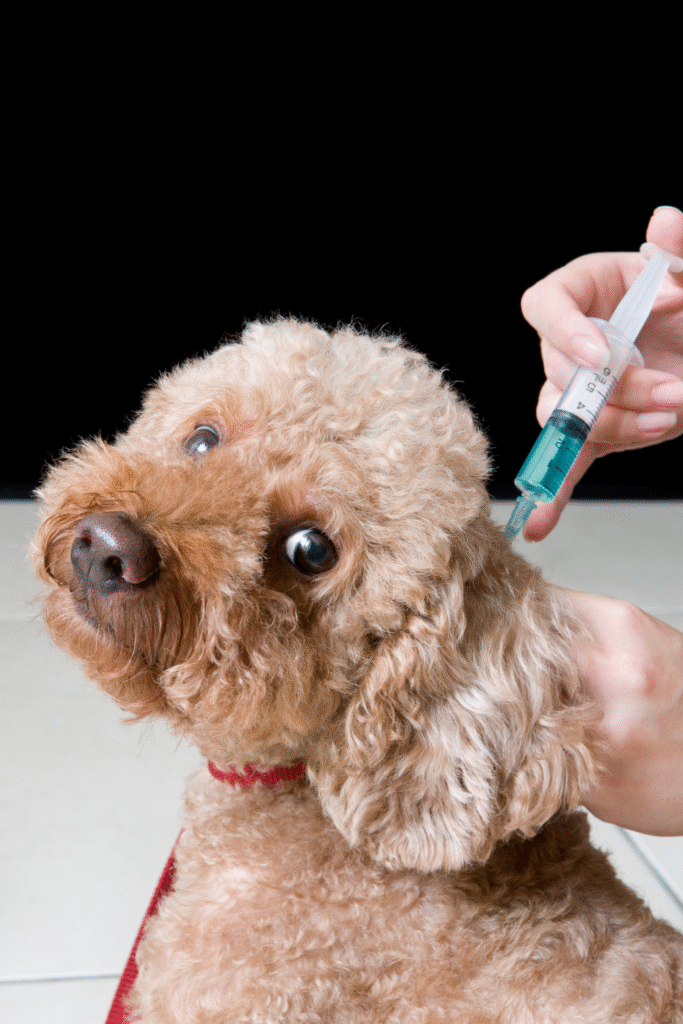
Ideal Dog Vaccinations Schedule
The ideal dog vaccinations schedule may vary depending on factors such as age, lifestyle, and location. However, most veterinarians will recommend the following core vaccines for puppies:
- Distemper
- Parvovirus
- Adenovirus (canine hepatitis)
- Parainfluenza
These core vaccines are typically given in a series of shots starting.
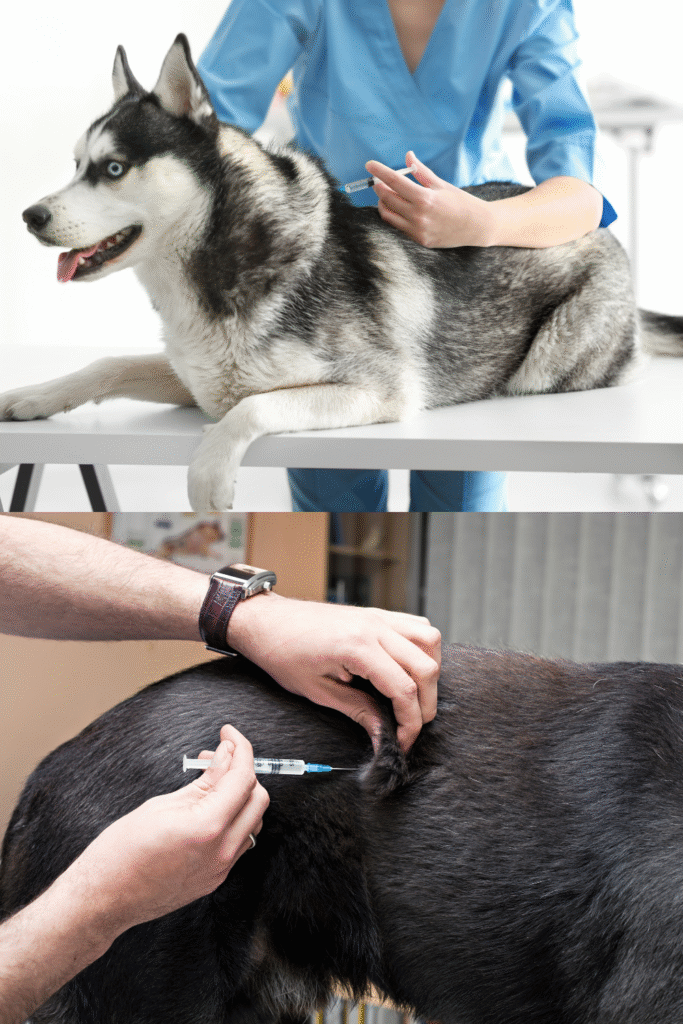
Why Vaccinations Are Crucial for Your Dog
Vaccines play a vital role in preventing serious diseases in your beloved pet.
Just as humans rely on immunizations to avoid certain infections, dogs too need vaccinations to build immunity against harmful viruses and bacteria.
Vaccinating protects not only your dog but also reduces the risk of spreading diseases to other animals and humans.
One essential reason for vaccination is the prevention of fatal diseases such as rabies, distemper, and parvovirus.
These illnesses pose severe health risks and may require costly treatments if contracted.
Vaccines can drastically reduce the chance of infection and provide long-term protection with booster shots.
Furthermore, public health regulations in many regions mandate certain vaccinations, such as rabies, ensuring pets and communities are kept safe.
If your dog is frequently outdoors, travels with you, or interacts with other pets, vaccines like Bordetella, which prevents kennel cough, are especially critical.
For a clearer picture, here’s why vaccinations are essential at every stage of a dog’s life:
| Reason | Details |
|---|---|
| Disease prevention | Shields against deadly and debilitating illnesses. |
| Community health benefits | Helps eradicate and control outbreaks. |
| Compliance with legal requirements | Rabies vaccines often required by law. |
| Cost-effectiveness | Protects against expensive disease treatments. |
| Travel readiness | Ensures your dog meets entry requirements in other regions. |
Vaccinating your dog is a proactive step. It ties directly to a healthier life, minimal illness-related interruptions, and significant peace of mind for you as a pet parent.
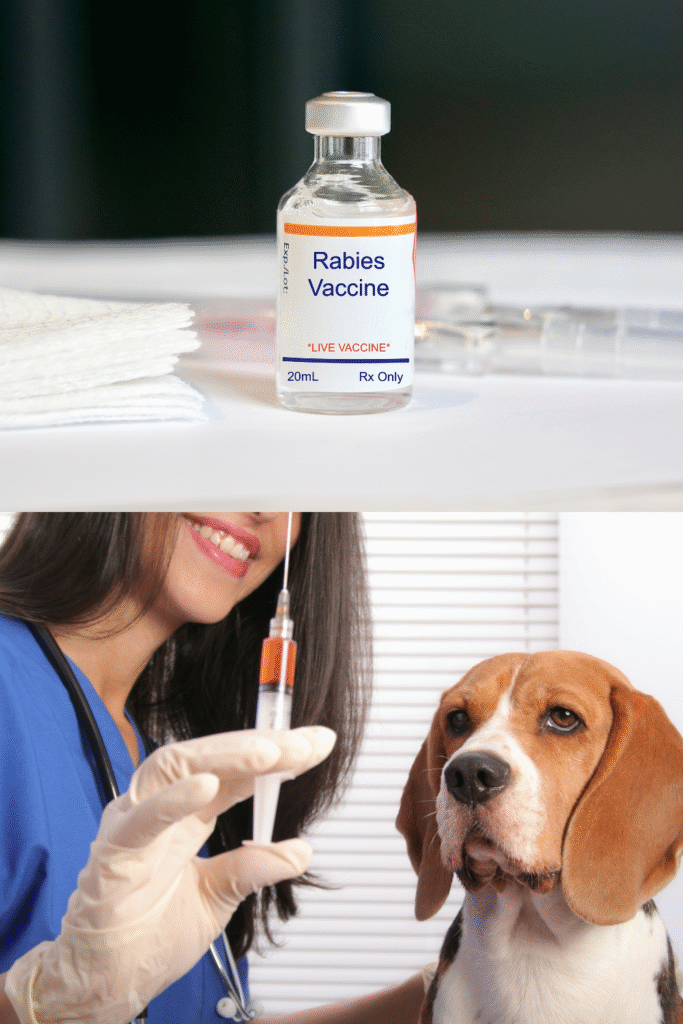
Core Dog Vaccine: Rabies
Rabies Vaccine
The rabies vaccine is essential for protecting your dog from the deadly rabies virus, which affects the central nervous system and is transmissible to humans.
This vaccine is often legally mandated due to the severe implications of rabies, both for pets and public health.
Typically administered annually or every three years, depending on the type, the rabies vaccine is a crucial component of any effective dog vaccination schedule.
Ensuring your dog is consistently up to date on rabies vaccination not only keeps them safe but also complies with legal and travel requirements.
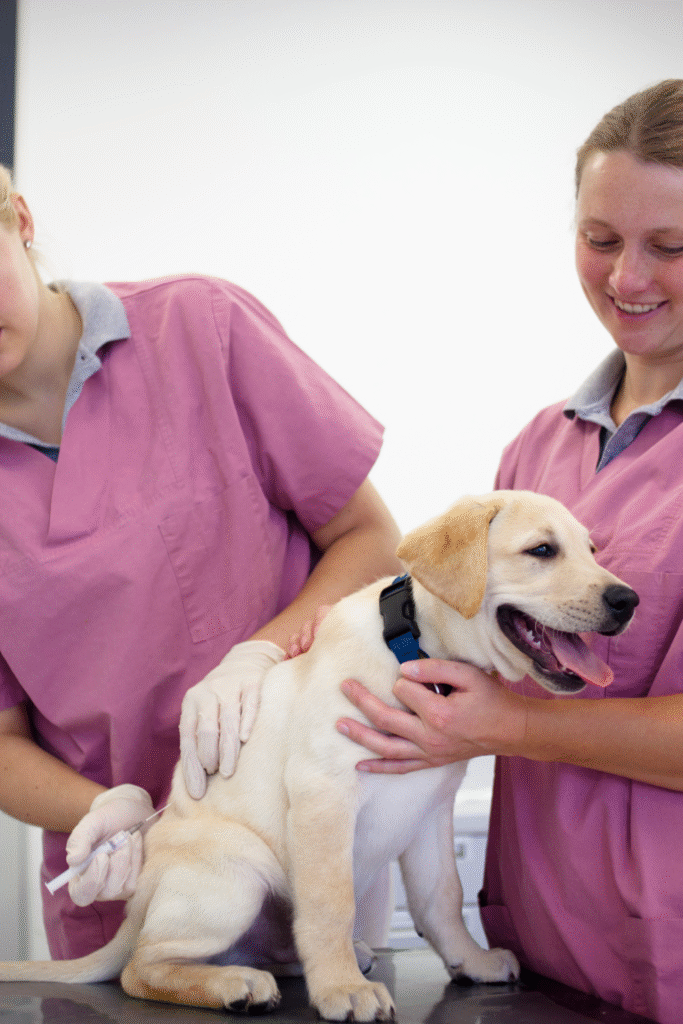
How to Prepare Your Dog for Vaccinations
Preparing for dog vaccinations schedule can ensure a smoother experience for both you and your pet.
Follow these steps to help your dog feel comfortable and safe during the process:
- Schedule an Appointment with the Veterinarian: Book your appointment in advance and ensure your vaccination schedule aligns with your dog’s medical needs. Consult your vet about any specific preparations required.
- Check Your Dog’s Health: Make sure your dog is in good health prior to vaccination. If your dog has been showing signs of illness, notify the veterinarian as vaccines should generally be given only to healthy animals.
- Help Your Dog Stay Calm: Familiarize your dog with the veterinarian’s office by taking them for a visit beforehand, if possible. Bring their favorite blanket or toy to provide comfort during the appointment.
- Provide a Balanced Diet: Ensure your dog is eating nutritious meals, as a healthy diet supports a robust immune system, which is essential for an effective response to vaccines.
- Exercise Before the Appointment: Take your dog out for a walk or play session to help release some energy. This can make them more relaxed when it’s time for the vaccination.
- Bring Relevant Documents: Carry your dog’s vaccination records or any required paperwork, especially if you’re unsure which vaccines are due.
- Monitor After the Vaccination: After the procedure, keep an eye on your dog for any adverse reactions, like lethargy or swelling, and reach out to your vet if you have concerns.
By following these steps, you can make the vaccination process safe, comfortable, and efficient for your furry friend
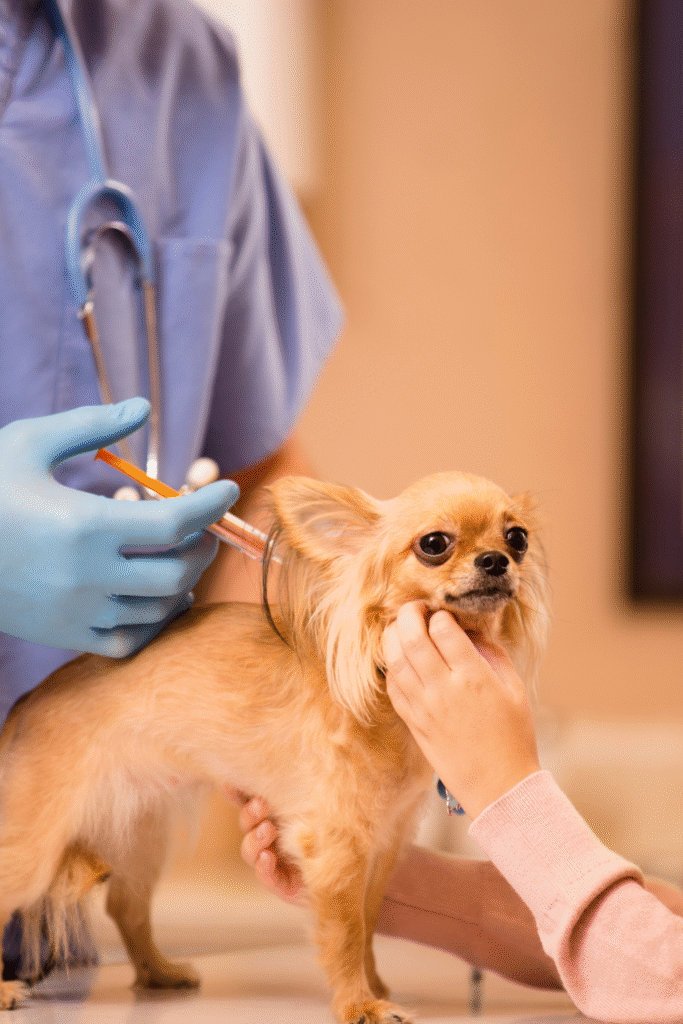
Puppy Vaccination Schedule
Puppies are particularly vulnerable to diseases because of their developing immune systems.
A well-structured dog vaccinations schedule can keep them protected right from the start.
Ideally, vaccines begin when the puppy is eight weeks old and continue at intervals.
Here’s a typical schedule for puppy vaccinations:
| Age (Weeks) | Vaccines Given | Purpose |
|---|---|---|
| 6–8 weeks | Distemper, Parvovirus | Start of core vaccines to build immunity. |
| 10–12 weeks | DHPP (Distemper, Hepatitis, Parvovirus) | Boost immunity with a 2nd dose. |
| 12 weeks | Rabies | Required by law; provides lifelong protection. |
| 14–16 weeks | DHPP + optional Leptospirosis | Completes puppy core series; non-core optional. |
| 16+ weeks | Bordetella & Influenza | Protects against contagious respiratory issues. |
Puppies rely on initial vaccinations to build immunity passed from their mother.
The timeline ensures they don’t over-vaccinate while still safeguarding against the window where they’re most vulnerable.
For example, the 5-in-1 DHPP vaccine (Distemper, Hepatitis, Parvovirus, and Parainfluenza) eliminates the need for separate vaccinations while ensuring robust protection.
Tailor the schedule with your veterinarian for any additional non-core shots like Lyme disease or influenza.
By committing to this early-life schedule, you can set the foundation for your puppy’s health for years to come.
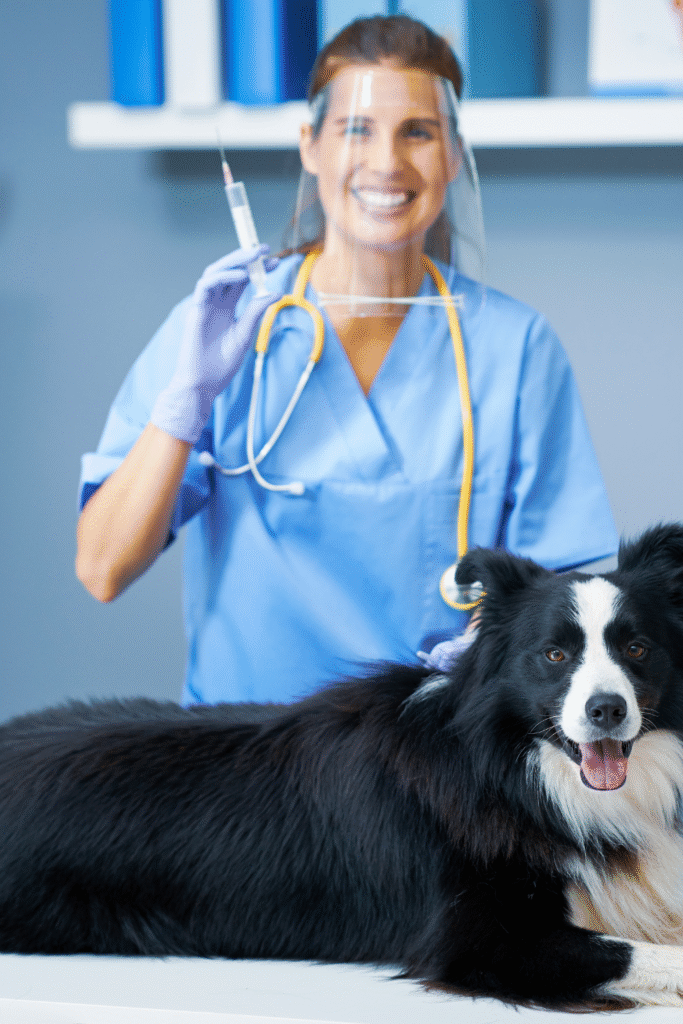
Adult Dog Vaccines and Booster Shots
Once your dog graduates from the puppy phase, adult dog vaccines and boosters keep their immunity strong.
Depending on the vaccine type, boosters might be required annually or every three years.
Core vaccinations like rabies and DHPP are continuous necessities for most dogs.
But lifestyle-based non-core vaccines, such as Lyme disease or Leptospirosis, may or may not be required, depending on risk factors.
Here’s a general booster schedule for adult dogs:
| Vaccine | Booster Frequency |
|---|---|
| Rabies | Every 1-3 years |
| DHPP | Every 3 years |
| Bordetella (Kennel Cough) | Annual |
| Lyme Disease | Annual (if exposed) |
| Leptospirosis | Annual |
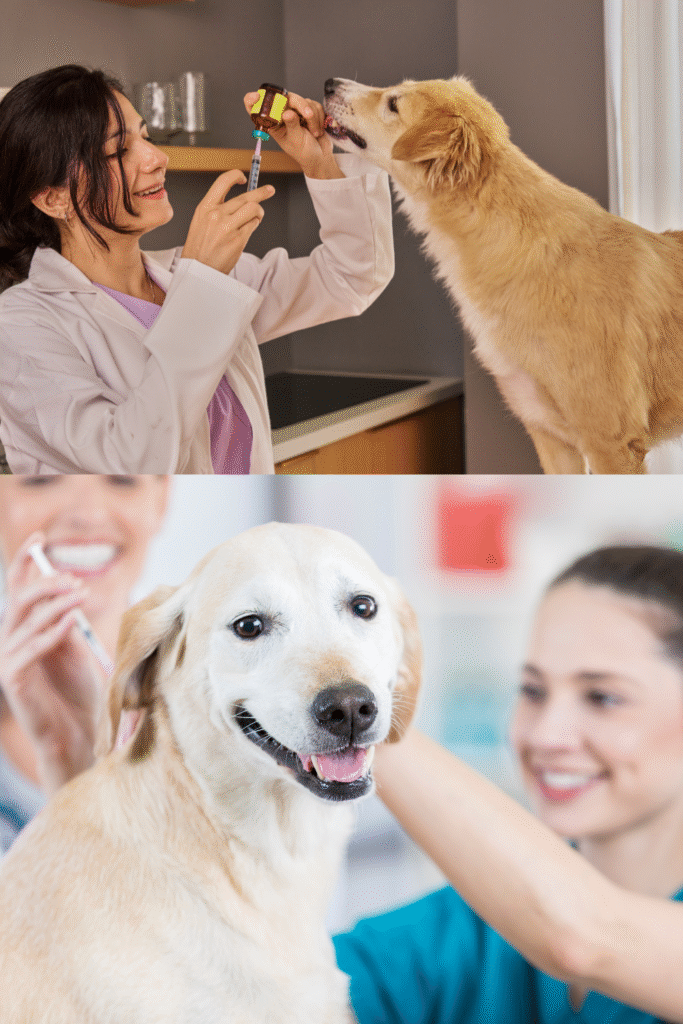
What Dogs Need in a Core vs. Non-Core Vaccine Schedule
Knowing the difference between core and non-core vaccines can help you decide what’s absolutely necessary for your dog versus situational vaccinations.
Core Vaccines
Core vaccinations are essential for all dogs because they protect against diseases with widespread occurrence, severity, and public health risks.
| Core Vaccine | Disease Prevented |
|---|---|
| Rabies | Rabid bites in dogs and humans. |
| DHPP | Distemper, Hepatitis, Parvovirus. |
Non-Core Vaccines
Non-core vaccines depend on specific factors such as geography, lifestyle, or dog breed.
| Non-Core Vaccine | Given When |
|---|---|
| Lyme Disease | If frequent exposure exists. |
| Bordetella (Kennel Cough) | For dogs in boarding/daycare. |
By sticking to this schedule, you give your dog robust protection from severe illnesses while considering optional vaccines for unique exposures.
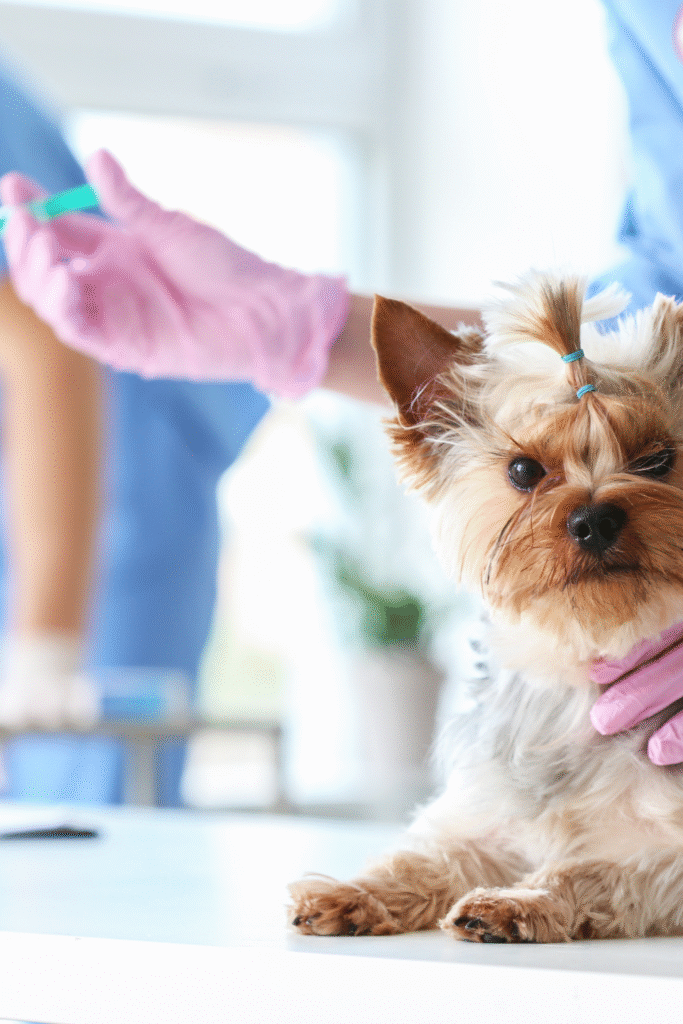
5-in-1 Vaccine for Puppies Schedule
The 5-in-1 vaccine is a combination shot that protects puppies from five major diseases, including Distemper, Hepatitis (Adenovirus), Parainfluenza, Parvovirus, and sometimes Leptospirosis. It is a critical part of a puppy’s vaccination schedule, providing comprehensive protection during their early, vulnerable months.
| Age | Vaccine Dose |
|---|---|
| 6-8 weeks | First 5-in-1 vaccine dose. |
| 10-12 weeks | Second 5-in-1 vaccine dose. |
| 14-16 weeks | Third 5-in-1 vaccine dose. |
| 12 months | Booster dose. |
Following this schedule ensures that puppies develop strong immunity as they grow, safeguarding them from these life-threatening diseases. Regular boosters are recommended annually or as advised by your veterinarian to maintain immunity.
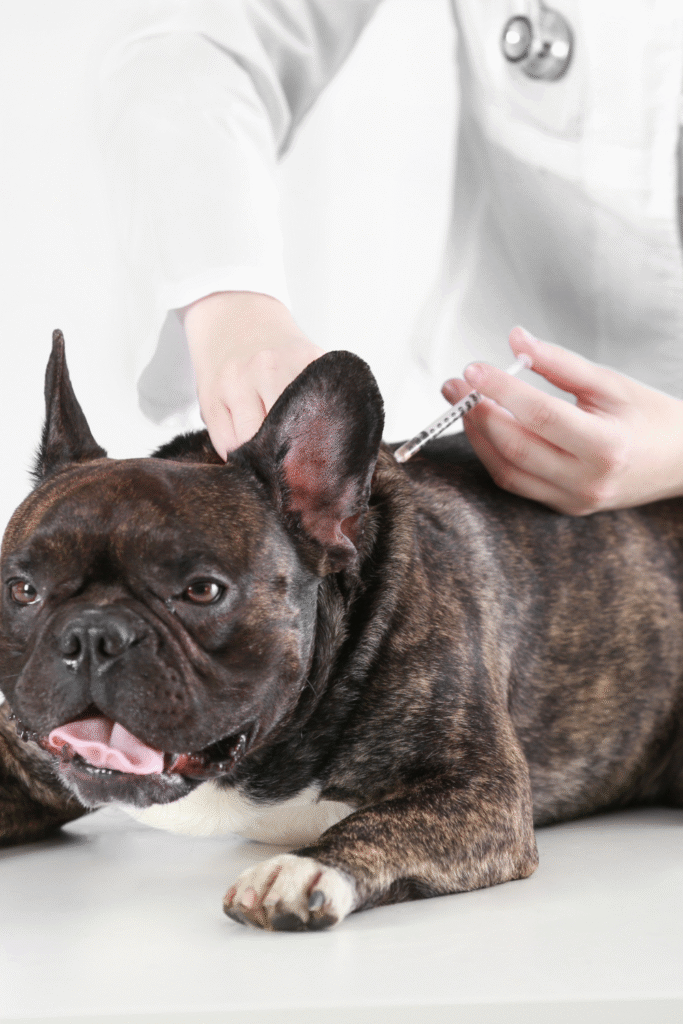
FAQs About Dog Vaccinations
- What vaccinations should dogs have?
Core vaccines include rabies and DHPP. Additional vaccines depend on lifestyle risks, like Bordetella for kennel cough or Lyme disease for exposure-prone areas.
- What are 5 in 1 vaccines for dogs?
The 5-in-1 (DHPP) provides immunity for Distemper, Hepatitis, Parvovirus, Parainfluenza, and sometimes Leptospirosis.
- How many vaccinations does a dog need?
Puppies generally need 3-4 initial core vaccines. Adult dogs require boosters every 1-3 years, depending on the vaccine.
- What is the 7 disease vaccine for dogs?
It typically refers to vaccines like 7-way dog shots (includes DHPP + additional protections).
5. At what age should puppies get their first vaccinations?
Puppies should receive their first vaccinations when they are 6-8 weeks old to protect them from common and severe diseases.
6. What happens if I don’t vaccinate my dog?
Unvaccinated dogs are at a higher risk of contracting serious or fatal illnesses such as Parvovirus, Distemper, or Rabies, which are often preventable with vaccines.
7. Are vaccines safe for dogs?
Yes, vaccines are safe and rigorously tested to ensure they are effective. While mild side effects like soreness at the injection site can occur, serious side effects are extremely rare.
8. Can a vaccinated dog still get sick?
While vaccines provide significant protection, no vaccine guarantees 100% immunity. However, vaccinated dogs that contract illnesses are likely to have milder symptoms and recover more quickly.
9. Should senior dogs still get vaccinated?
Yes, senior dogs typically still need vaccines, especially core ones like Rabies. A veterinarian can tailor a vaccination plan based on the dog’s age, health, and lifestyle.
10. What should I do if my dog reacts to a vaccine?
Mild reactions like swelling or lethargy are common and usually subside within 24 hours. If your dog shows severe symptoms like difficulty breathing, vomiting, or seizures, contact a veterinarian immediately.
By staying informed, you can protect your dog while ensuring they enjoy a healthy, happy life.
Dog vaccinations are essential tools to guard against diseases and ensure your furry friend’s active, healthy lifespan. Stick to a well-structured vaccination schedule and consult with your vet to tailor it further based on lifestyle and risks.( Dog Vaccinations Schedule)
